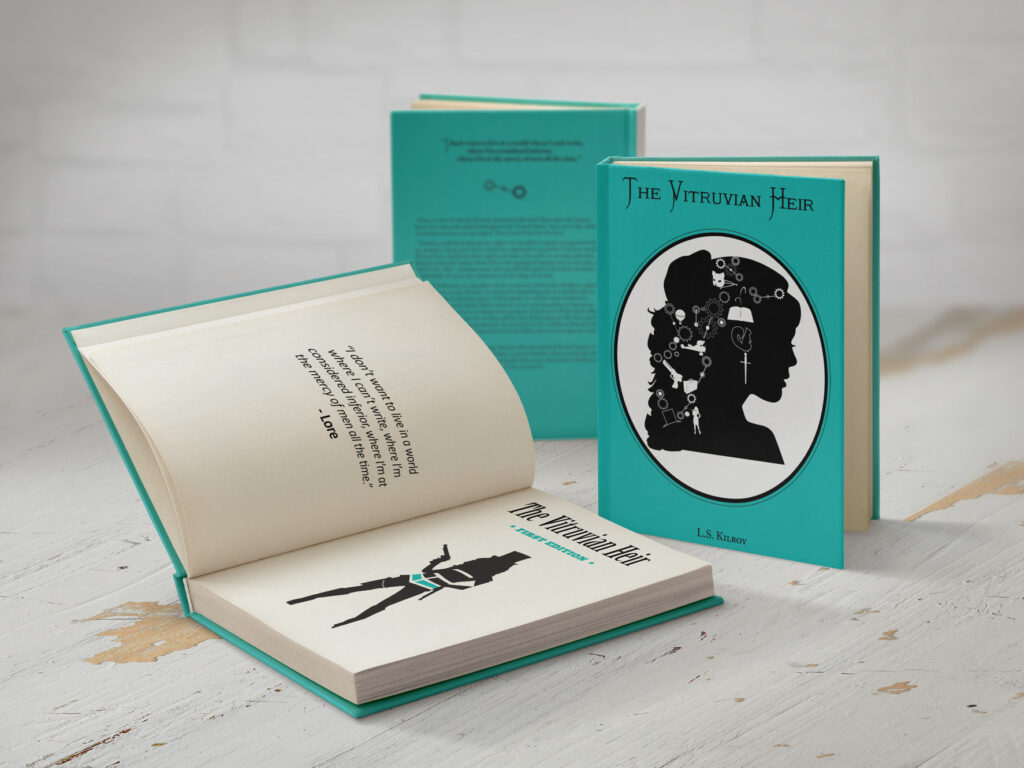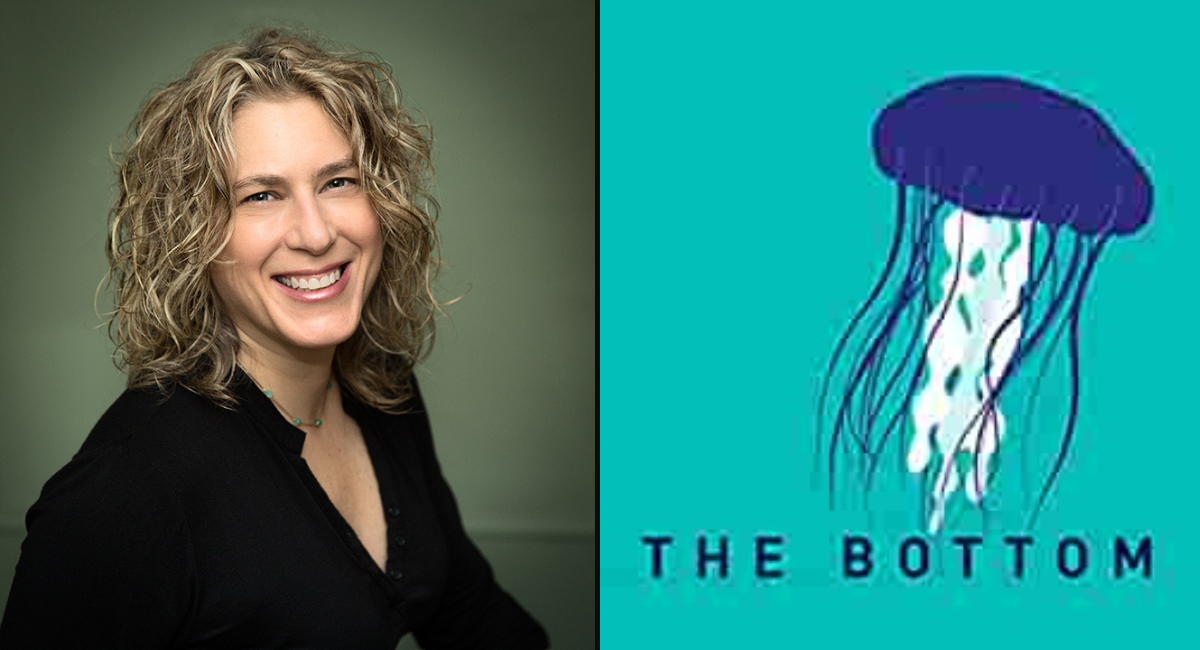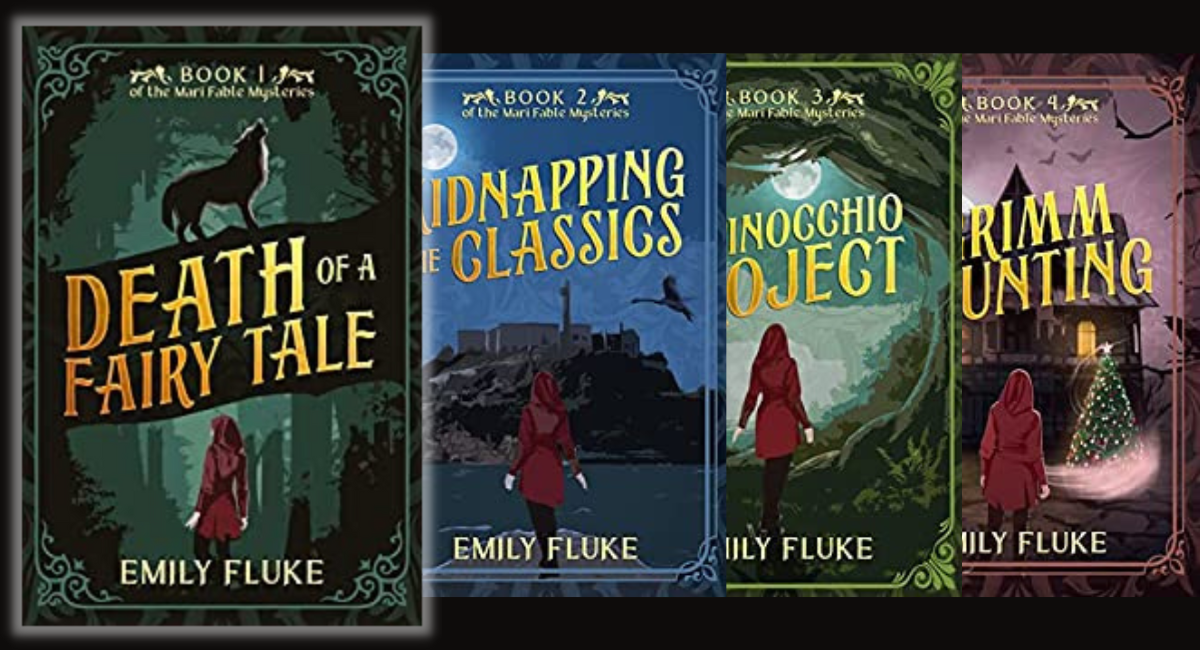Welcome to Vitruvia, readers, writers, and shark fans!
In this futuristic series, women have completely lost their rights as society has transitioned to Victorian standards and patriarchal dominion. The Vitruvian Heir is a steampunk rendition of Margaret Atwood’s The Handmaid’s Tale meets Julia Quinn’s Bridgerton with a reluctant heroine reminiscent of The Hunger Games’ Katniss Everdeen and Divergent‘s Tris Prior.
Read on for our review of The Vitruvian Heir, Book I: The Unraveling, what we’re anticipating in The Vitruvian Heir, Book II: The Awakening (also out now!), and our exclusive interview with author L.S. Kilroy.
The Vitruvian Heir, Book I: The Unraveling
In this futuristic society, the United States of America has fallen and made way for a steampunk Jane Austen era where patriarchal dominion reigns to frightening extremes. As a result of a series of natural and societal disasters, the world fell, and a new world called The Vitruvian Empire was ushered in when the newly appointed ruler expressed his favor of the societal structure, expectations, and gender roles of the Victorian era. Though this shift favored men in high positions, it left women without any of the rights or abilities they spent decades fighting for. The difference in this world is the level of violence in their suppression and the extent to which women are punished if they attempt to do anything glorified in former America that would imply self-expression or independence.
 Lorelei Fetherston, or Lore, is the daughter of the aristocracy, but she does not fit in as expected. She desperately wants to write, but just like many of the other liberties women previously had, writing is heavily controlled throughout the Empire, and being caught penning words comes with swift, severe punishment.
Lorelei Fetherston, or Lore, is the daughter of the aristocracy, but she does not fit in as expected. She desperately wants to write, but just like many of the other liberties women previously had, writing is heavily controlled throughout the Empire, and being caught penning words comes with swift, severe punishment.
Lore also finds herself in a romantic arrangement that hardly feels romantic at all. Slotted to marry her best friend, who she loves but is not in love with, Lore can’t help but wonder if this is all that she can expect from love, despite what she heard from the old stories and what she wished to write herself.
Much of Lore’s consternation stems from the stories that she hears from her grandmother, specifically the few memories the elderly woman has of the world before this dramatic shift. In light of her stories, Lore can’t help but dream of being able to love and express herself freely, not to mention witness women experience many of the same liberties aristocratic men lorded over general society now.
The book takes a sharp turn when Lore decides to leave the Empire behind in favor of former Texas, a place beyond the borders of Vitruvia called Hopespoke where people are free, women are equal members of society, and intriguingly, the mysterious female leader of the community trains women in Black Operations. Along with the arachnid-drawn carriages in Vitruvia, the microorganism clouds, and even the system of gears attractively tied into the woman’s hair on the front cover of the novel, this new Black Ops element elevates the steampunk element in this futuristic, neo-Victorian novel.
The Vitruvian Heir, Book I: The Unraveling evolves into a fast-paced, action-packed story of women embracing their strength and individuality and pushing back against the patriarchal regime that was so deeply oppressing them. Some of the action sequences are extreme, and we might even call “gory” and bordering on being something more mature than a Young Adult audience might expect, but these moments are also incredibly engaging and almost cathartic to read during such a politically charged time in our current history.
The first installment in this eye-opening and politically charged trilogy is an incredible example of dystopian world-building and the creation of a reluctant hero who’s, both, destined and doomed to fulfill this role. This book confronts us about some of our deepest concerns in our world but gives us a cathartic release through driven, intelligent, and strong female characters and leaders who are prepared to risk it all to revert this neo-Victorian world. It’s a story that, all at once, fulfills us and also leaves us wanting more of everything—Lore’s journey, her relationships, black ops training, and perhaps even more arachnid-drawn carriages…
This is a suitable tale for the Young Adult audience it’s written for, but with unique storytelling, action, steampunk elements, Victorian immersion, and parallels with our own political landscape, this will be enjoyed by adults just as well, if not even more so. Fans of The Hunger Games and the Divergent trilogy will be perfectly at home here, as well as those who enjoyed the reluctant heroine element in The Nine Lives of Chloe King and the female spies in Red Sparrow and Black Widow.
The Excitement Continues with The Vitruvian Heir, Book II: The Awakening
Now that Lore is back in the Vitruvian Empire and its future rests in her hands, she has serious decisions to make, and the very first decision she has to make involves her relationship with her former mentor, Ursula, who has been demoted to a prisoner. Lore is expected to attend the next summit in Orsia among the world’s most powerful leaders… in admittedly one of the most dangerous places in the world, and only Ursula can prepare her for it. But there are evils that even Ursula and Avery can protect her from or equip her for. To make matters worse, there’s something sinister rolling into Vitruvia while Lore is absent, which Sawyer and vigilante Lucy Shaw will struggle to suppress. Despite the world becoming less systemically oppressed, there are mysterious and sinister things at work that are ready to envelop and take over the world that no one, not even talented Lore, is ready for.
 The first novel in this trilogy is full of world-building work, stories from Lore’s grandmother’s earlier life, and flashbacks. Each of these played an integral role in the readers’ understanding and immersion into this world of Vitruvia, and the competing world of Hopespoke, and now that Lore has returned to Vitruvia and taken a higher position of power with her new knowledge in hand, I can’t wait to see how the story accelerates forward with this foundation already in place.
The first novel in this trilogy is full of world-building work, stories from Lore’s grandmother’s earlier life, and flashbacks. Each of these played an integral role in the readers’ understanding and immersion into this world of Vitruvia, and the competing world of Hopespoke, and now that Lore has returned to Vitruvia and taken a higher position of power with her new knowledge in hand, I can’t wait to see how the story accelerates forward with this foundation already in place.
The black operations integration was interesting and invigorating in the first book, and the skills came easily to Lore. I’d love to see the role these trainings take in the next novel and how Lore takes her skills and knowledge to the next level, both in action sequences and how it impacts her intellectual decision-making. Basically, I’m interested in seeing how all of this is continuing to inform Lore as a well-informed, increasingly independent advocate and woman.
By the end of Book I, readers discovered that there’s much more to Vitruvia and Hopespoke’s relationship and how their presumably oppositional practices overlap than what first meets the eye. Now with this new person in power, I’m very interested to see how the world continues to evolve and impact its people.
And of course, I can’t wait to see how Book II will set us up for the final installment in the trilogy: The Vitruvian Heir, Book III: The Reckoning—and what exactly the reckoning will be…
In Conversation with L.S. Kilroy: The ICYMI Edition

Image Courtesy of L.S. Kilroy
To celebrate the publication of The Vitruvian Heir, Book II: The Awakening, L.S. Kilroy agreed to an exclusive interview with us, which we’re immensely grateful for, about what to remember from Book I, what to expect from Book II, and where the series is going from here.
MLT: Thank you so much for speaking with me about this. I’m so excited about the second book of the Vitruvian Heir series. Where did the idea for the original story come from?
LSK: Well, I grew up an asthmatic only child in a neighborhood that skewed very Golden Girls, so it was lucky for me that I loved books. After my mother gifted me Wuthering Heights at age twelve and I became properly obsessed, I started making up my own stories. I didn’t own a computer yet (it was the early 90s), so my ideas for future novels lived under my bed in an old Snoopy and Woodstock suitcase. Scores of plot summaries and potential book jackets I’d illustrated all boasted lame titles like World War III.
That one is particularly notable because the seed of it grew into The Vitruvian Heir. During sophomore year, my history teacher had been painting us a picture of the time when Catherine de’ Medici ruled the French court. She had a group of beautiful female spies called the Flying Squadron (L’Escadron Volant), whom she recruited to seduce important men in court and then report back to her. I took this fascinating lesson and formed an idea for a new story. What if a future version of the United States somehow comes under the control of an emperor who commands that everything be returned to the Victorian and Edwardian periods – women are stripped of rights, have to wear corsets, etc? And what if there is a woman who runs an underground circle of female spies trained to extract information from powerful men? What if she is planning a coup? What if she sends her best girl in to charm the emperor himself? But then the girl falls in love with him. My teenage sensibility clearly got the best of me there. This version of the story eventually met its demise along with its bedfellows somewhere between high school and college.
Then, in 2014, when I began noticing a disturbing resurgence against women’s reproductive rights among certain states, the germ of this idea resurfaced and became The Vitruvian Heir. History repeats itself. And we can never take our freedoms for granted because as long as inequitable patriarchal ideologies exist in the upper echelons of government, these freedoms will always be under threat. And we’ve seen this realized with the overturn of Roe v. Wade – an event many deemed impossible because it was precedent. I don’t think anything is impossible when those in power are desperate to keep it. Women need to realize this at a younger age. The responsibility of protecting those freedoms belongs to each of us. Complicity – whether born of privilege, convenience, or ignorance – has contributed to the oppression of women throughout history, particularly women of color.
This is the reason I write: to point out societal flaws through the emotion of human experience in the hope that it makes people think twice about the way things are – or the way they could be. I want everyone who reads this book to become a rebel.
MLT: Do you originally imagine this being a trilogy?
LSK: Yes, but I was honestly afraid to commit to writing a trilogy, so I initially put Book I out as a stand-alone and gave myself the space to decide. When it came down to it, I really did want to bring Lore’s story full circle.
MLT: How has your relationship with the series changed as you’ve continued to publish it?
LSK: I was very much in control for the first book, but beyond that, the story itself has definitely gone in some directions I didn’t expect. As an author, I sort of love it when my own creations pull a fast one on me. And, of course, I’m attached to it and to the characters. I’m not sure how I’ll feel when I write the final sentence of Book III – probably a mixture of relief and bittersweet sadness. Books are, in a sense, like children that spring from your imagination, so when one comes to a close it’s like a child growing up and leaving you to be out in the world. You feel proud but also profoundly sad. And you worry about how the world will treat your baby. Maybe that’s why I’m taking so long to finish it.
MLT: For readers who are just joining you now, why would you recommend they start reading the series now? Why now?
LSK: Because again, to reiterate a little of what I said in my first answer, this story is terrifyingly relevant. Unfortunately so. I think there’s a great lesson in it about what could potentially come to pass if we don’t start making some different choices as a society.
And to be clear, this book isn’t just for women. It’s for everyone. When I speak about things like “inequitable patriarchal ideologies,” I’m not being anti-male. This book isn’t about “women vs. men,” and frankly, neither is what’s going on in our world (in my opinion). We so easily fall for the polarizations – and that’s also what’s keeping us from being unified. The real issue is not a gender battle. It’s a battle between people who are abusing their power and the rest of us. It just so happens that the traits that go hand-in-hand with abusing one’s power often reflect those that embody what we think of as toxic masculinity. This doesn’t necessarily mean all those abusing power are men. Each of us is made up of both masculine and feminine energy, but there’s an imbalance of these energies in society. And we’ve misdefined what it means to be successful according to this imbalance. That’s what needs to change. I’m talking people over profits. I’m talking selflessness over selfishness. Humility over ego. Soft skills over hard skills. Empathy over ambition. And what I’m getting at in this trilogy (and you’ll see it as it plays out) is that anyone who’s given too much power can become a villain, even if they have good intentions to start.
MLT: Have you thought about continuing on past the trilogy? Spin-off stories, novellas, a second trilogy?
LSK: YES! Every day I think about how much fodder there is for complementary content set in this world. There are so many of my characters who could have their own spin-offs. There’s potential for prequels, alternative series, and hidden scenes I could write as bonus stories or novellas. There’s a rich trove if I decide to go that route that both excites and exhausts me to think about.
MLT: For those who haven’t read the first book in the series, can Book II work as a standalone, or is it vital to read them all? (Be honest with this one! Telling them that you can read them independently/in any order won’t likely deter them from reading them all.)
LSK: Not really. Book I is too foundational in Lore’s evolution to skip. Also, much of the world-building happens in the first book, and I think it could be confusing for readers to miss that.
Now for the Spoiler Section!

Image Courtesy of L.S. Kilroy
MLT: Since this is the second book, let’s recap. What would you say are the most important takeaways or most important things for readers to remember, going into Book II?
LSK: I think the most important takeaway from Book I is that Lore is now a new leader who has also just come into her own as far as having a voice. You’re going to see how she hones and develops that voice in Book II – and the unlikely person who helps her do it. And she’s quite young, only 19. She’s almost like Queen Victoria, who came into power at 18. It’s an overwhelming amount of responsibility for someone who’s just entered adulthood.
Additionally, Lore has the added stress of being pregnant and becoming a mother on top of running (and trying to fix) a country. So, while she’s trying to be this bastion of fortitude, she’s also incredibly fragile and vulnerable as she’s opening Vitruvia to the rest of the world again.
MLT: You know that feeling of reading a book for the first time and wishing you could read it for the first time again? What’s one moment in the second book that you wish you could WRITE for the first time again?
LSK: Masaru Hoshi is a new – I don’t want to full-on say he’s a villain because he’s sort of more morally gray – but anyway, he’s on the scene in this book as one of the world leaders Lore meets in her new role as empress. And while he’s formidable, he’s also incredibly charming and dangerously alluring, kind of to the point where readers may be a little in love with him. (I know I am.) There’s a spicy scene between him and Lore that I wouldn’t mind writing again.
MLT: What do you hope readers will experience, learn, and feel from this book?
LSK: I hope readers will come away with the idea that it doesn’t matter how dire a situation seems, especially if it appears like bad people may come out victorious. If you believe in your own inner strength and if you have right on your side, you’ll eventually be able to swing the balance. And if you have to employ a little of their own tactics against them to do so – well then, that’s what you’ve got to do.
MLT: You referenced The Handmaid’s Tale and Bridgerton when describing the overall series. What comparative title do you think is the closest for this singular book?
LSK: Hmm, this is hard to answer. I’m not sure there’s a title I’ve read that’s comparable (which I think is a good thing), but I would say any book where suddenly a young person comes into power for which they may not be ready and they rise to the challenge.
MLT: What’s one tip you would like to give your younger writer self (of any age or writing stage)?
LSK: Get yourself into a routine, girl. (This is a constant struggle.) And stop always feeling like you have to write chronologically. We both know the magic happens when you break from order.
 L.S. KILROY is an irreverent sort of person who likes to write about things. Growing up an asthmatic only child in a neighborhood that skewed very Golden Girls, she made friends with books at a young age because she had to – luckily, she also really liked them. Early exposure to the classics fueled her own writing. At fifteen, a man in a bookstore asked her what she wanted to be when she grew up and she replied, “Writer,” without hesitation.
L.S. KILROY is an irreverent sort of person who likes to write about things. Growing up an asthmatic only child in a neighborhood that skewed very Golden Girls, she made friends with books at a young age because she had to – luckily, she also really liked them. Early exposure to the classics fueled her own writing. At fifteen, a man in a bookstore asked her what she wanted to be when she grew up and she replied, “Writer,” without hesitation.
‘Writer’ is a title that has driven her both personally and professionally. She holds a Bachelor’s degree in English from Merrimack College and a Master’s degree in Writing, Literature, & Publishing from Emerson College. By day, she’s a communications professional; by night, she’s an award-winning indie author.
Kilroy lives in a rural community in Massachusetts with her family and fur babies. Aside from writing, she loves being creative in the kitchen, belting out show tunes, traveling, throwing epic dinner parties, reading, and scouting out vintage finds at consignment shops.






0 Comments